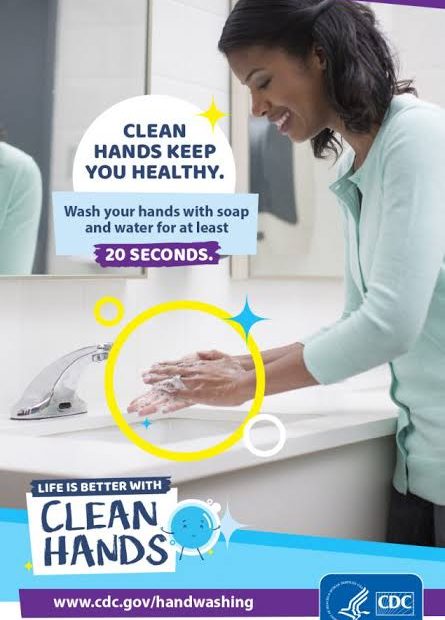The 15th of October was made the ‘Global Handwashing Day’ in 2008. In light of this advocacy day, we are going to talk about handwashing.
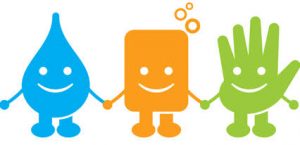
Global Handwashing Day
Photo Credit: WHO
Talking about handwashing seems cliche already but the truth is, this topic of discussion can never lose its relevance. Handwashing is indispensable! There are some surprising facts you will learn today that should open your eyes and make you do away with the nonchalance.
What is Handwashing?
Handwashing can be defined as an act that entails the thorough cleansing of one’s hands. For handwashing to be done correctly, soap and water (at least) are needed. This is essential to remove all forms of dirt and unwanted microorganisms that are already stuck on the hand.
The culture of handwashing only becomes effective, for an individual, when it is practiced regularly. More importantly is, how long we spend washing our hands. The World Health Organization recommends a minimum of 20 seconds for the process.
Handwashing is also known as Hand Hygiene.

Why is it So Important That We Wash Our Hands?
It’s understandable if some people wonder why it’s necessary to wash our hands. After all, the majority take their bath every day and it’s not like we leave out our hands. The hands serve as a linkage between objects and the body as a whole. So, as much as it helps us interact with our external (physical) environment, it puts the body in harm’s way also, exposing us to germs and therefore, illnesses.
With this in mind, it is safe to conclude that washing of hands reduces germ spread from object-to-person, person-to-object, and person-to-person. Hand hygiene is a good starting point for disease prevention.
A good example of a disease handwashing prevents is the COVID-19 transmitted via droplets from an already infected individual and potentially contaminated surfaces. Other examples are cholera and diarrhea that are transmitted via the faeco-oral route.
Overall, the handwashing culture promotes healthy living and paves way for better-managed healthcare in the community at large.
What are the General Questions on Handwashing?
There are quite many handwashing-related questions although, I have highlighted a few that I consider very crucial and basic in the handwashing practice.
When Should I Wash My Hands?
It’s categorically impossible to keep germ-free hands but washing your hands frequently, would limit the number of germs you carry around. There are, however, two key times handwashing should be inevitable. These are before and after contact with food and faeces respectively.
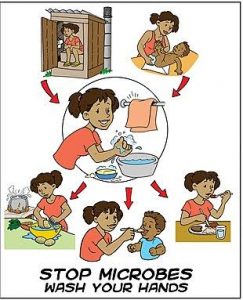
Photo Credit:Wikipedia
Other important moments are:
- Before and after you treat a sick/injured person.
- After you come in contact with anything pet-related.
- After handling garbage or dirt in general etc.
How do I wash my hands correctly?
As mentioned earlier, soap and water are the needed materials. The chemical makeup of hand washes (soap) just differs slightly from other soaps. However, most brands of soap-as long as you stick with the complete routine-gets the job done. To wash your hands properly,
- Wet your hands first.
- Apply the soap in a generous amount.
- Rub it extensively on your palms, in between your fingers, to the back of your palm, and, even reach for underneath your nail beds. Do this until it lathers (soap foams). And yes, don’t forget the 20 seconds recommendation! It’s easier if you hum the regular ‘Happy Birthday’ song twice.
- Rinse out the soap well.
- Finally, make sure you dry your hands. Germs are easily attracted to wet hands.
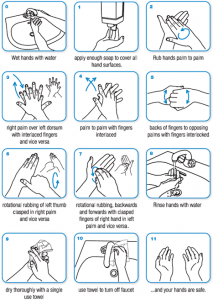
Photo Credit:WHO
Does the Temperature of the Water used Matter?
Not necessarily; because every temperature works well. Although, with warm water, the soap lathering effect functions maximally to remove greasy dirt. For this reason, the U.S. Food & Drug Administration and CDC recommend warm water, especially before food preparation.
What should happen in cases where I don’t have access to soap?
If there’s just soapy water around, that’s still something. On the premise where there is none at all, other cleaning agents, for example, ash that is compatible with the skin can be used. Washing your hands with water alone should be the last resort.
Can Hand Sanitizers Substitute Handwashing with Soap?
Alcohol-based sanitizers cannot get rid of visible dirt but, it comes in handy for mobility and in cases of emergencies. The glaring challenge, however, is the fact that it is not cheap.
To ensure you are using it well, cross-check with the following steps.
- Apply a good enough amount to your palm. You can check the label for specific instructions.
- Rub between your palms and fingers until it dries off. The 20 seconds rule also applies here.
Do I have to dry my hands?
Yes, you do. Remember we said wet hands are easily contaminated. To dry your hand, use a clean towel or cloth. Air drying is an alternative.
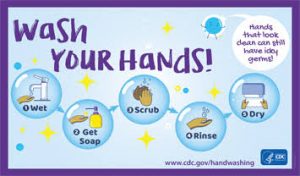
Image Credit: CDC
How Can This Habit be Easily Inculcated?
Good habits such as handwashing are usually hard to form so even if these alternatives below make them easier in a sense, you still have to put in the effort.
- Treat it as a family activity: Families have traditions that vary. For example, telling the children bedtime stories, watching a football game/movie together on a Friday night, etc. Handwashing is an activity that can also feature in your family’s routine. You can make out a fun activity with handwashing or other related things. It is like the best approach to quickly make this a part of you. Plus, you are going to be helping the others- family members in the process.
- Make it a statutory kitchen hygiene: Some people are already so used to rinsing every kitchen utensil before use which is a good thing. You can also get to this level as regards handwashing before contact with food. But, you have to make that commitment to yourself.
- Add it to your hygiene routine: Just like you want to brush your teeth first thing in the morning or take a shower after a day’s work. You can wash your hands after you feed your dog or when you get to work.
In Conclusion,
The 2020 Global Handwashing Day has been themed ‘Hand Hygiene for All.’ This theme reminds us that we must collectively work towards universal access and practice of handwashing with soap to achieve healthy living for all now and in the future. You have a part to play!

A phenomenal lady whose skills and style do the talking. Her unending desire for better healthcare from persons, through to the public has always been her drive. Over the years, she has volunteered with different NGOs that try to promote a healthy lifestyle.
She hopes to one day create an avenue for people to get the guidance needed for nutrition essential for life, amongst other things. She believes knowledge paves ways. And so, makes it a responsibility to keep learning and impacting others.
Deborah Solomon is a believer and currently a medical student at the Obafemi Awolowo University, Nigeria. She enjoys writing, traveling, music, and cooking.
